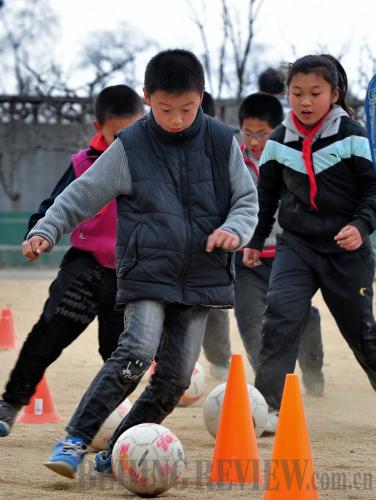|
 |
|
CAMPUS SOCCER: Primary school students in Qinhuangdao, north China's Hebei Province, attend a football training session on April 16, 2012 (YANG SHIYAO) |
Haan was coach of the Chinese men's team in 2003 and 2004 when they finished as runners-up at the Asian Cup in 2004. He also worked for Chinese clubs including Chongqing Lifan, Tianjin Teda and Shenyang Shenbei between 2009 and 2012. He said that he saw little progress in Chinese soccer over the last 10 years.
"There is no continuity," Haan told Xinhua News Agency. "When I left the national team I already said that China needs to build its own identity. That may change slowly over time, but that identity must be there."
After failing to qualify for the 2006 FIFA World Cup finals, Haan was succeeded by Chinese coach Zhu Guanghu, followed by Vlado Petrovic from Serbia, then Chinese coaches Yin Tiesheng and Gao Hongbao. Camacho took the helm in 2011 but failed to carry the team through the World Cup qualifiers.
"China has good players, but they have learned little recently. With Camacho, they have a defensive coach. Dutchman Jan Olde Riekerink is coach of Under 20. It is strange to have a Spaniard as first team coach and a Dutchman as youth coach. They have very different ideas," Haan said, adding that the Dutch always emphasize positioning.
The CFA also admitted that Camacho was not the only one to blame. "All coaching staff are responsible for unreasonable training arrangement and team management, and we are very disappointed with the players' behavior during the 1-5 loss," the association said in an open letter of apology released on June 24.
After the devastating defeat on June 15, the national team's forward Gao Lin said that the Chinese team was simply weaker than their Thai opponents. Critics countered that the Thai team was a youth team and regarded as second-string.
"It's time to reexamine the situation where the main players on the national team are from the same club and some highly paid players have passive attitudes when playing national matches. The team often looks terribly disorganized on the field," said Jin Shan, a sports commentator.
"We all saw their superficial problems of morale, fighting spirit and that they underestimated rivals, but the CFA needs to figure out the cause," said Wang.
A lame system
Netizens have joked that anyone can point out problems in Chinese soccer, but "institutional degradation" is the ultimate one, caused by corruption and poor youth training systems.
An online survey with more than 37,000 participants showed that more than half of those polled are not surprised by the June 15 defeat, since the long history of fraud and corruption at the club level has held Chinese soccer teams back from making any real progress.
China cracked down on soccer corruption in 2009. In the following three years, a total of 58 people involved in corruption and match-fixing, including CFA officials, senior club executives, coaches, players and referees, were brought down. Thirty-three of them, including former CFA chiefs Nan Yong and Xie Yalong, who are both serving 10-and-a-half year jail sentences for taking bribes, were banned for life from soccer-related activities, and 25 were banned for five years.
It has had a positive effect, but nepotism, bribery and match-fixing are still pervasive at the local level, Wang said.
| 